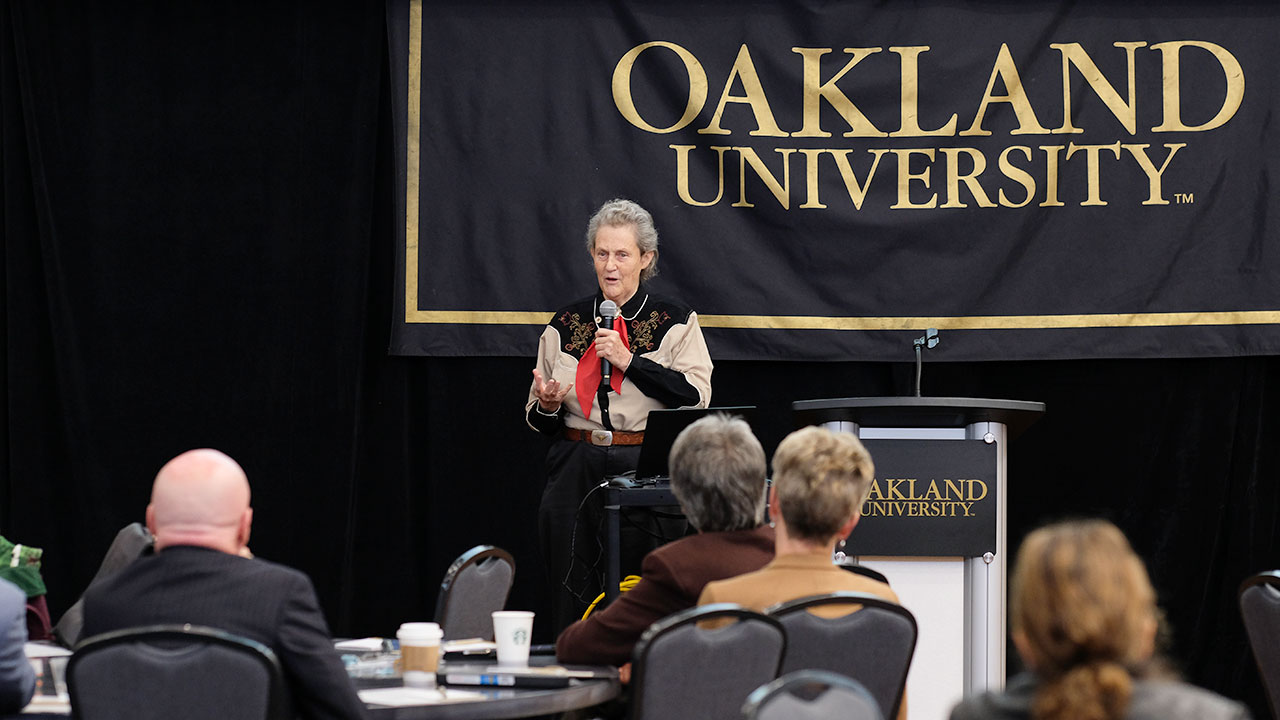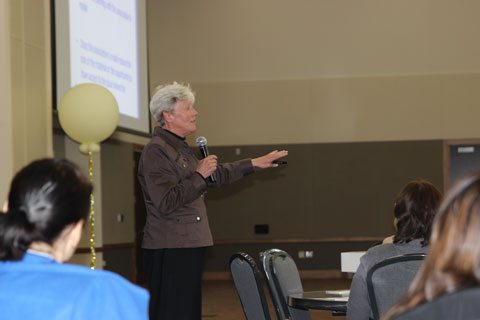- YouTube
- TikTok
Autism expert Temple Grandin shares inclusive message at OU

The Oakland University Office of Disability Support Services and Center for Autism Outreach Services (OUCARES) collaborated to bring Dr. Temple Grandin – professor, author and advocate – to Oakland University this week for a workshop focused on supporting individuals with Autism Spectrum Disorder in higher education.
Professor Temple Grandin shared her experiences living with Autism Spectrum Disorder, as well as perspectives on how people on the spectrum can succeed at school and work. |
Grandin, who is on the autism spectrum, spoke to OU faculty and staff members about the importance of creating an inclusive environment where people with autism and other learning differences can succeed in school and in the workplace.
She cited famed physicist Stephen Hawking’s advice to “concentrate on the things your disability doesn’t prevent you from doing well.”
“That’s the kind of attitude we need to have in thinking about outcomes, because kids who are different have uneven skills," she explained. “They’re good at one thing and rotten at something else. We need to be building up the things that they’re good at.”
Grandin, a self-described “visual thinker,” said that her early struggles in mathematics derailed her initial aspiration to become a biomedical engineer, but she eventually found a niche in construction and industrial design.
She noted that people with autism and other developmental disabilities can be found in many industries, from construction and skilled trades, to computer programming, to retail and sales.
“People think in different ways,” she said. “We need visual thinkers. We need pattern/mathematics thinkers, and we need verbal thinkers.”
From left: Glenn McIntosh, Vice President for Student Affairs and Chief Diversity Officer; Sarah Guadalupe, Director of Disability Support Services; Kristin Rohrbeck, Director of OUCARES; Professor Temple Grandin; Kevin Corcoran, Dean of the College of Arts and Sciences. |
Grandin advised those with learning differences to capitalize on their unique talents and create a portfolio they can show to employers.
“You sell yourself by showing your work,” she said. “You make yourself so good that they’re going to have to (hire you).”
Grandin often spoke from personal experience, telling stories of how she overcame adversity throughout her life – from being bullied in school and struggling to navigate the transition between school and work.
“My mother had a very good sense of how to stretch me just enough without throwing me into the deep end of the pool,” she said. “We need to stretch (kids with learning differences) so they don’t become recluses, and they learn how to work.”
After her early struggles, Grandin went on to a life and career of great renown. In 2010, she appeared on Time magazine’s annual list of the 100 most influential people in the world. She is a member of the National Women’s Hall of Fame and a fellow at the American Association for the Advancement of Science.
She has authored numerous bestselling books and is also the subject of an award-winning film. A recognized expert in livestock behavior, she holds a Ph.D. in Animal Sciences from the University of Illinois and is a professor at Colorado State University.
Maureen Ziegler, Autism Education and Intervention Specialist, talked about strategies for supporting individuals with Autism Spectrum Disorder. |
Grandin’s keynote was followed by a training session led by Autism Education and Intervention Specialist, Maureen Ziegler. The session focused on helping educators and service providers support people with Autism Spectrum Disorder in various contexts, including higher education, employment, community involvement, independent living and quality of life.
The event was sponsored by Disability Support Services, the Division of Student Affairs and Diversity; Office of Diversity and Inclusion; Oakland University Center for Autism Outreach Services (OUCARES); Oakland University William Beaumont School of Medicine; School of Engineering and Computer Science; School of Health Sciences; School of Nursing; and the Honors College.
What is Autism Spectrum Disorder?
According to the Centers for Disease Control and Prevention, one in 59 children in the U.S. is diagnosed with Autism Spectrum Disorder. It is a developmental disability that can cause significant social, communication and behavioral challenges.
Symptoms of ASD include:
- Avoiding eye contact and preferring to be alone
- Repeating actions over and over again
- Having trouble understanding other people’s feelings or talking about their own feelings
- Experiencing delays or regression in verbal skills
- Having unusual reactions to the way things smell, taste, look, feel, or sound
To learn more, visit cdc.gov/ncbddd/autism/facts.html.


 October 31, 2018
October 31, 2018

